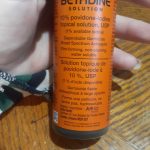Dou, my female mixed-breed dog, was spayed a while ago. She weighs around 38 kg, which is too heavy for her, making it hard for her to walk because her joints struggle to support her weight. She’s been on joint supplements (as attached below) for a year, and that’s helped her move better. Recently, though, she’s been vomiting a lot, especially after eating or drinking, and the vomit is yellow. She’s also lost her appetite. I took her to a local vet and followed their treatment, but she’s not getting better. I’d like some online advice to help her feel better.
I just had my 3 year old Goldens eyes checked by an opthalmologist. She has GA in her right eye. I tried researching GA but PRA keeps coming up. What kind of care do I need to do for my dog?
Hello vets
I hope I can get some help please.
Looking for funding options or a vet that works with people on financial aid (location Ontario toronto). My dog dewclaw came off exposing the inside. I am doing my best to keep it clean from infection. Do I need to take him to see a vet?
I attached a photo also I got some Betadine but want to ensure the proper use. I was told to dilute as it’s strong it’s 10% advice would be great
My dog is not bleeding, no signs of serious discomfort. Able to run and walk still. Keeping an eye for infection
Happend on January 30th I live in Toronto west end
Any advice for the mean time would be super appreciated. I have been using dog bandage, gauze, cleaning with mild soap and water. I used peroxide the day it broke then after a walk because dirt got in the wound. I have now discontinued using it. I used ointment photo attached below. But I needed somthing to prevent infection. So I got Betadine and was told to dilute my dog is about 20 pounds. I also let it air out in between bangade changed he wear cone so can’t lick the wound. Theb 1 hour in morning morning before bed I let air out.
Comments
I have a poor feral cat out back who got an abscess. I did not know what was going on about 8 days ago when I noticed her face or side of its head swelling. The cat seemed to be disoriented. In retrospect, I think the cat was febrile and suffering.
The next day the abscess popped. It was a big open sore for 2-3 days. Now it is healing, and the cat seems more comfortable. The cat is moving, and eating food & water in a couple of different locations. It has also slept in two different shelter spaces. (I replace the bedding in those.)
The wound on the side of its face appears to be healing. Given that the cat is feral, I did not want to try to administer antibiotics topically or orally. I considered putting the cat in a cage, and taking it to the vet. However, given its bad physical health, I almost sure the vet would rightfully put the cat down. Also, the trauma and stress of trapping the animal would be counterproductive.
The sore is very large – but as I said healing. I am afraid of secondary infections or chronic, growing infections. Are there any signs I can look for to determine whether or not the cat has a good chance of recovery, or is going downhill?
Joe
Comments
Is Skout’s Honor Probiotic Lavender Dog Deodorizer or any commercial dog deodorizing spray safe for dog with skin allergies?
Comments
Hi, my 3 yr. old Springer sleeps with me very happily. Lately though she is on the bed, off the bed etc which is disturbing my sleep. Any ideas please. Her bed is at the side of the bed but she is not really interested.
Comments
I have a 12 year old golden retriever that has developed a red bump on her skin under her fur. The lump is not painful to touch and she does not seem to notice it, but it has grown quite a bit in the last few weeks and I can see little blood vessels inside of it. She has a vet appointment in 10 days, but I am really hoping someone can tell me if they recognize this bump in the photo and tell me what it could be. I have putting castor oil on it which is why it has goop around it. She is also panting a lot, regardless of the room temperature.
Comments
My 13 yr old feline, DLH with multiple teeth cleanings and extractions started sneezing Fall 2023. My vet recommended Lyseine, which has helped. She had another teeth cleaning and single extraction Nov 2024. This weekend she began sneezing multiple times a day and now has runny eyes. I would also swear her lips are inflamed around her whiskers. I contacted the vet and we will try an antibiotic. What else should I do to assist? I am getting a humidifier and will keep her in my bathroom when I shower each day. Should I change her litter type? They both currently use Dr. Elyse Attract Long Hair. Obviously if the antibiotic doesnt work I will take her back in for further examination, Thank You!
Comments
My cat is an American short hair and is two years old,suddenly he stopped eating his food (he eats Smalls, ground chicken and turkey)and started vomiting yellow but when he is throwing out it sounds like he is chocking, he is being acting very different no eating ,no playing and I try to feed him and hydrate him with a syringe but he vomits every time. This happened like 4 months ago too and I took him to the vet and it was so expensive and did not help me at all,they made an x ray and didn’t find anything and I change his food because in that time he only ate dry food. I thought everything was find now with wet and quality food but is happening again. Please help me if you have any idea what can I do?. I have no pet insurance and no budget to spend on vets.
Comments
Hi. I have a 17 year old cat( Approximately calico. She has elevated liver and kidney levels but not too bad and is on KD dry food but loves wet also. About 2 months ago she started grooming excessively. Now her front legs are brown , not white anymore and everwhere she sleeps she leaves brown stains. 2 vets have said it’s iron in her saliva .. she is on a very low dose gabapentin and she has gotten a bit better with the excess grooming . I have been told that all cats have iron in their saliva but why all of a sudden is it so much and is there anything to do. Fecal urine and bloodwork mostly normal










Hello,
I typically don’t see these appointments ending up as an emergency issue. I have had one dog who needed intensive care for tetanus after a nail was trimmed too short and the nail bed was bleeding. This is however very rare.
In almost all cases these heal with minimal veterinary treatment but it is important to not let the pet lick the area and keep it clean and dry.
I cannot tell you whether it needs veterinary attention. I always have to err on the side of caution and recommend a veterinary visit.
Best of luck.
Krista.